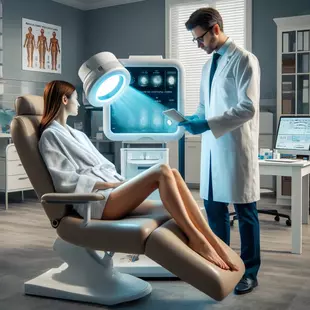UV measurements in medical applications
UV measurements play a crucial role in the medical application of ultraviolet (UV) radiation, especially when it comes to controlling UV dose and irradiance. This technology is important in various areas of medicine, including dermatology, phototherapy and disinfection.
UV light is often used to treat various skin conditions such as psoriasis, eczema and vitiligo. In these cases, precise dosing is crucial to be effective while minimizing the risk of side effects, such as skin burns or increased risk of skin cancer. UV measurements ensure that patients receive exactly the right amount of UV light necessary for their treatment.
UV measuring devices for UV irradiance
Modern UV meters can measure UV irradiance very accurately and are able to quantify the energy that hits a certain area over a certain period of time. These devices use sensors that react specifically to the different UV wavelengths, such as UVA, UVB and UVC. The data helps to set the therapy devices correctly and to monitor compliance with the dosage instructions.
In medical practice, UV measurements help to maximize the effectiveness of treatment and ensure patient safety. For example, in phototherapy, the dose is adjusted according to the progress of the treatment and the patient's response to the therapy. UV measurements are also crucial for the development of new medical treatment protocols, where different doses and irradiance levels are tested to determine the optimal conditions for treatment.
Accurate measurement and control of UV dose and irradiance is a critical factor in the safe and effective use of UV light in medicine. Advances in measurement technology and better understanding of the effects of UV light on the human body have meant that UV therapies are now safer and more effective than ever before. Ongoing research and development in this area promises further improvements in treatment and increased patient safety.
Special requirements for UV measurements in a GMP environment
The GMP environment (Good Manufacturing Practice) is crucial for quality assurance in production, particularly in the pharmaceutical, biotechnology and food industries. GMP standards ensure that products are consistently produced and controlled according to quality standards.
Here is a summary of the specific requirements in the GMP environment, with a focus on user protection / passwords and data recording:
Quality assurance systems GMP requires the implementation of comprehensive quality assurance systems. These systems must monitor all aspects of production processes and environments to ensure compliance with quality standards. This includes regular staff training, adherence to strict procedures and ensuring equipment integrity, which includes UV calibration.
Validation and qualification
All equipment, systems and processes must be validated and qualified to prove their suitability and consistency for the intended purpose. Documentation of these validations is a key part of GMP requirements and must be accurately maintained. Existing processes are rarely changed, and as your supplier of UV measuring devices and light sources, we adhere to this.
User protection and passwords
Access controls Strict access controls are required in the GMP environment to ensure that only authorized personnel can access sensitive areas and systems. The use of passwords and other security mechanisms helps to protect the integrity of the production environment. Our products support different user groups, locking of settings and automatic data logging of UV measurement data.
Data recording
Documentation and records GMP requires complete documentation of all production processes. Data must be tamper-proof and stored in such a way that it can be traced and verified. The electronic data recording of UV measurement data includes device identification, calibration date etc. for this purpose.
In summary, compliance with these special requirements in the GMP environment is not only a question of legal compliance, but also crucial for ensuring product quality and safety. Just ask us!




